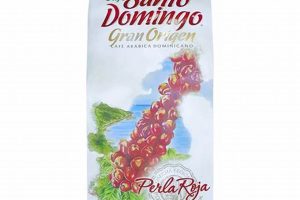A specific type of ethically sourced and produced beverage, it prioritizes the well-being of coffee farmers and the preservation of their surrounding ecosystems. This approach often involves direct trade relationships, fair pricing structures, and sustainable farming practices. As an example, coffee beans grown on farms committed to biodiversity conservation and providing fair wages to workers could be considered part of this category.
Its significance lies in its potential to improve the livelihoods of coffee-growing communities and mitigate the environmental impact of coffee production. Historically, traditional coffee farming often exploited workers and damaged the environment. However, this particular approach offers a more equitable and sustainable model, fostering long-term stability and resilience within the coffee industry.
The subsequent sections will delve into the specific sourcing practices, economic impacts, and environmental considerations associated with ethically produced and sourced coffee. These elements will be discussed in greater detail to provide a comprehensive understanding of its overall impact.
The following guidelines provide insights into identifying and selecting ethically produced and sourced coffee, promoting responsible consumption and supporting sustainable practices.
Tip 1: Seek Certification Labels: Look for certifications such as Fair Trade, Rainforest Alliance, or Bird Friendly. These labels indicate that the coffee has met specific standards for fair labor practices, environmental protection, and biodiversity conservation.
Tip 2: Investigate Direct Trade Relationships: Explore brands that engage in direct trade, establishing direct relationships with farmers and cooperatives. This ensures fair prices and supports community development initiatives.
Tip 3: Research Sourcing Transparency: Examine the brand’s website or packaging for information about the origin of the coffee beans and the specific practices employed by the farmers. Transparency builds trust and allows for informed purchasing decisions.
Tip 4: Prioritize Shade-Grown Coffee: Opt for coffee grown under a canopy of trees. Shade-grown coffee preserves biodiversity, provides habitat for wildlife, and reduces the need for chemical inputs.
Tip 5: Support Sustainable Farming Methods: Choose coffee grown using organic or regenerative agricultural practices. These methods minimize environmental impact, improve soil health, and promote long-term sustainability.
Tip 6: Consider the Roast Level: Different roast levels can impact the flavor profile and characteristics of the coffee. Experiment with various roasts to find the preferred taste while still supporting ethical sourcing.
Tip 7: Explore Smaller Roasters: Many small, independent roasters are committed to sourcing coffee in a responsible and ethical manner. Supporting these businesses can contribute to a more sustainable coffee industry.
By adhering to these guidelines, consumers can make informed choices that support ethical coffee production, benefiting both farmers and the environment. The principles of fair trade, transparency, and sustainability are paramount when selecting coffee.
The subsequent section will address the broader implications of choosing ethically sourced coffee, further emphasizing its positive impact on the coffee industry and beyond.
1. Ethical Sourcing
Ethical sourcing is fundamental to the concept of ethically sourced coffee. It represents a commitment to ensuring that coffee beans are produced and traded in a manner that respects the rights and well-being of farmers, workers, and the environment. This dedication is not merely a marketing claim but a core principle that shapes the entire supply chain.
- Fair Labor Practices
Ensuring fair wages, safe working conditions, and the absence of forced or child labor is paramount. This involves rigorous monitoring and auditing of farms and processing facilities. For example, an ethically sourced coffee initiative may collaborate with independent organizations to conduct regular inspections, addressing any violations and ensuring compliance with labor standards. The cost of labor for all participants in the bean process is fairly compensated for the work and time completed.
- Environmental Stewardship
Ethical sourcing demands environmentally responsible practices, minimizing the negative impact on ecosystems. This includes promoting biodiversity, conserving water resources, and reducing the use of harmful chemicals. A “sanctuary coffee” farm might implement shade-grown coffee cultivation, which provides habitat for birds and other wildlife, while reducing the need for deforestation. Preserving natural ecosystems is vital for a sustainable future.
- Transparency and Traceability
A commitment to transparency is crucial, allowing consumers to trace the origin of their coffee and understand the conditions under which it was produced. This involves providing detailed information about the farms, cooperatives, and communities involved in the coffee supply chain. A traceability system can allow consumers to scan a QR code on the packaging to learn about the farmers who grew the beans and the sustainable practices they employ. The more information consumers can have, the better.
- Direct Trade Relationships
Direct trade involves establishing direct relationships between roasters and farmers, eliminating intermediaries and ensuring that farmers receive a fair price for their coffee. This empowers farmers and strengthens their economic stability. By cutting out the middleman, more value stays within the community where the coffee is produced, fostering economic growth and resilience.
These facets of ethical sourcing are interconnected and essential to the integrity of coffee. By prioritizing fair labor, environmental stewardship, transparency, and direct trade, ethically sourced coffee initiatives can contribute to a more sustainable and equitable coffee industry. These initiatives work as a model for future producers.
2. Farmer well-being
Farmer well-being is inextricably linked to ethically produced and sourced coffee. It moves beyond simply providing a means of subsistence and focuses on fostering a thriving and sustainable environment for coffee-growing communities. This encompasses economic stability, social equity, and improved living conditions, ensuring that farmers can prosper and invest in the future.
- Fair Compensation and Living Wages
Providing fair prices for coffee beans and ensuring that farmers receive living wages is paramount. This enables farmers to meet their basic needs, invest in their farms, and improve their quality of life. Ethically produced coffee initiatives often negotiate directly with farmers or cooperatives to establish prices that reflect the true cost of sustainable production, providing a stable income stream. These wages enable the economic activity of farming communities.
- Access to Education and Training
Providing access to education and training programs empowers farmers to improve their farming practices, increase productivity, and enhance the quality of their coffee. This may include training in sustainable agriculture, pest management, and post-harvest processing. Empowering farmers with knowledge fosters a more resilient and sustainable coffee industry.
- Healthcare and Social Services
Ensuring access to healthcare and social services is crucial for the well-being of coffee-growing communities. This may include providing access to medical clinics, sanitation facilities, and other essential services. Ethically produced coffee initiatives often invest in community development projects that improve healthcare and social services, contributing to the overall well-being of farmers and their families. Accessible health and sanitation lead to a more productive work force.
- Community Empowerment and Participation
Empowering coffee-growing communities and ensuring their participation in decision-making processes is essential for promoting their well-being. This may involve establishing farmer cooperatives, supporting community-led development initiatives, and advocating for policies that protect the rights of coffee farmers. Empowering farmers to have a voice in the coffee industry ensures that their needs and concerns are addressed.
The commitment to farmer well-being is a defining characteristic of the “sanctuary coffee” approach. By prioritizing fair compensation, access to education and healthcare, and community empowerment, these initiatives contribute to creating a more sustainable and equitable coffee industry. These practices ensure the long-term viability of coffee farming and improve the lives of those who cultivate this valuable crop.
3. Environmental preservation
Environmental preservation forms a cornerstone of ethically sourced coffee and is central to the essence. It emphasizes the reduction of environmental impact throughout coffee production, focusing on conserving biodiversity, safeguarding water resources, and promoting sustainable farming practices. Environmental preservation ensures that coffee is produced in a way that minimizes harm to the ecosystems on which it depends, directly contributing to the long-term viability of coffee-growing regions. For example, agroforestry practices, where coffee plants are grown alongside native trees, provide habitat for wildlife, prevent soil erosion, and sequester carbon dioxide. These positive attributes of “sanctuary coffee” protect our lands and forests and help combat climate change.
The importance of environmental preservation within ethically produced coffee is multifaceted. By employing shade-grown coffee cultivation, deforestation is reduced, preserving vital forest ecosystems and providing habitat for migratory birds and other wildlife. Organic farming practices minimize the use of synthetic pesticides and fertilizers, protecting water sources from pollution and promoting soil health. Furthermore, waste management practices, such as composting coffee pulp and using it as fertilizer, reduce environmental pollution and close the nutrient cycle. These practices not only benefit the environment but also enhance the quality of the coffee itself.
The understanding of the environmental implications of coffee production enables consumers to make informed choices, supporting brands that prioritize sustainability. By choosing coffee that adheres to strict environmental standards, individuals contribute to protecting biodiversity, conserving natural resources, and mitigating climate change. The dedication to these areas helps to facilitate and ensure the sustainability of coffee farming for generations to come. Environmental preservation is not merely an add-on but an essential component of the ethically produced coffee philosophy, guaranteeing a more sustainable future for the coffee industry and the planet.
4. Direct trade
Direct trade, as a sourcing model, establishes a crucial link with sanctuary coffee. The connection lies in its ability to bypass traditional commodity markets, enabling coffee roasters to form relationships directly with coffee farmers and cooperatives. The effect is twofold: farmers receive a greater share of the profits, and roasters gain deeper insight into the production process, fostering transparency and accountability. It elevates the standard of practice in the area of coffee, giving the power back to those who cultivate this amazing product.
The importance of direct trade within a sanctuary coffee framework is its direct contribution to farmer well-being and sustainable practices. By eliminating intermediaries, direct trade empowers farmers to negotiate fair prices for their coffee, ensuring they receive adequate compensation for their labor and investments in sustainable farming methods. For instance, roasters committed to direct trade may provide farmers with technical assistance, training, and access to credit, supporting their efforts to improve coffee quality and environmental stewardship. These long-term partnerships ensure stability.
Understanding the practical significance of direct trade is crucial for both consumers and industry stakeholders. It demonstrates a commitment to ethical sourcing, transparency, and sustainability. Direct trade relationships foster trust and collaboration, leading to improved coffee quality, enhanced environmental protection, and greater social equity within coffee-growing communities. While challenges such as logistical complexities and the need for long-term commitment exist, the benefits of direct trade in advancing sanctuary coffee principles are undeniable. Direct trade should be the standard. The efforts lead to better farming, better coffee, and a better ecosystem.
5. Fair pricing
Fair pricing is inextricably linked to sanctuary coffee, representing a fundamental commitment to equitable economic exchange within the coffee supply chain. It addresses the historical imbalance where coffee farmers, often located in developing countries, receive disproportionately low compensation for their labor and products, perpetuating cycles of poverty and hindering sustainable development. Fair pricing aims to rectify this disparity by establishing transparent pricing mechanisms that guarantee farmers receive a price that covers their production costs, provides a living wage, and enables them to invest in their farms and communities. This ensures a sustainable economic framework that incentivizes ethical practices.
The significance of fair pricing as a component of sanctuary coffee lies in its ability to foster economic resilience and empower coffee-growing communities. By receiving fair compensation, farmers are less vulnerable to price fluctuations in the global commodity market, allowing them to plan for the future and make informed decisions about their farming practices. Additionally, fair pricing can incentivize farmers to adopt sustainable farming methods, as they are more likely to invest in long-term environmental stewardship when they have economic security. One example is the Fair Trade certification, which guarantees farmers a minimum price for their coffee and provides a premium that can be invested in community development projects.
Understanding the practical implications of fair pricing is crucial for both consumers and industry stakeholders. Consumers can support sanctuary coffee by choosing brands that prioritize fair pricing and transparency, ensuring that their purchases contribute to a more equitable and sustainable coffee industry. Industry stakeholders, including roasters and retailers, can implement fair pricing policies by establishing direct trade relationships with farmers, negotiating prices based on production costs and living wages, and transparently communicating their pricing practices to consumers. Challenges such as the complexity of global supply chains and the need for greater consumer awareness remain. Fair pricing’s key role in supporting sanctuary coffee’s goals is undeniable.
6. Sustainable practices
Sustainable practices are intrinsic to the definition and implementation of ethically-sourced coffee. These practices encompass a range of environmentally and socially responsible methods aimed at minimizing the negative impacts of coffee production while promoting long-term ecological and economic viability. Their connection to this product lies in the very foundation of its values, where coffee production respects the environment and promotes social equity. The adoption of sustainable practices such as organic farming, shade-grown cultivation, water conservation, and waste reduction is not merely a byproduct, but a necessity. This is in order to realize the commitment to the well-being of coffee farmers, their communities, and the planet.
The implementation of sustainable practices directly affects the quality and integrity. For example, shade-grown cultivation, where coffee plants are grown under a canopy of native trees, promotes biodiversity, reduces soil erosion, and sequesters carbon dioxide, resulting in higher-quality beans. Organic farming practices eliminate the use of synthetic pesticides and fertilizers, which can harm the environment and human health. Furthermore, sustainable water management techniques, such as rainwater harvesting and efficient irrigation systems, conserve water resources and minimize water pollution. These strategies exemplify how sanctuary coffee adopts environmentally conscious methods to ensure resource preservation.
Therefore, the integration of sustainable practices serves as a powerful mechanism for aligning economic incentives with environmental stewardship. By promoting sustainable agriculture, ethical labor practices, and community development, it can create a virtuous cycle where coffee production contributes to both the preservation of ecosystems and the improvement of livelihoods. While challenges, such as the higher costs associated with sustainable practices and the need for greater consumer awareness, exist, the fundamental link between “sustainable practices” and this coffee remains steadfast. It stands for the industry’s movement toward a more ethical and environmentally responsible future.
Frequently Asked Questions About Sanctuary Coffee
The following addresses common inquiries regarding ethically sourced coffee, providing clarity on its core principles and practical implications.
Question 1: What distinguishes this type of coffee from conventionally produced coffee?
Ethically sourced coffee prioritizes fair labor practices, environmental sustainability, and direct trade relationships. Conventional coffee production often overlooks these critical aspects, prioritizing profit maximization over the well-being of farmers and ecosystems.
Question 2: How can one verify that a coffee brand truly adheres to ethical sourcing standards?
Look for reputable certifications such as Fair Trade, Rainforest Alliance, or Bird Friendly. Investigate the brand’s transparency regarding sourcing practices and direct trade relationships. Scrutinize the labels and do your own research.
Question 3: Does ethically sourced coffee invariably cost more than conventional coffee?
While ethically sourced coffee may sometimes command a higher price, the cost reflects the true value of sustainable production and fair compensation for farmers. The price represents the standards.
Question 4: What are the primary environmental benefits associated with ethically produced coffee?
The environmental benefits include biodiversity conservation through shade-grown cultivation, reduced pesticide and fertilizer use through organic farming, and water conservation through efficient irrigation practices.
Question 5: How does direct trade benefit coffee farmers?
Direct trade empowers farmers by eliminating intermediaries, ensuring they receive a greater share of the profits and fostering long-term partnerships with roasters. Farmers have increased economic stability as a result.
Question 6: What role do consumers play in supporting the sanctuary coffee movement?
Consumers wield considerable power by choosing brands committed to ethical sourcing, raising awareness about sustainable coffee production, and advocating for policies that support fair trade and environmental protection.
In summary, the adoption of coffee can lead to a more equitable and environmentally sustainable coffee industry. By making informed purchasing decisions, individuals contribute to positive change.
The subsequent section will explore the long-term impact of ethically sourced coffee on coffee-growing communities and the environment.
Conclusion
The preceding exploration has illuminated the multifaceted nature of sanctuary coffee, emphasizing its commitment to ethical sourcing, farmer well-being, environmental preservation, direct trade relationships, fair pricing, and sustainable practices. These components are not isolated elements but rather interconnected principles that define a holistic approach to coffee production, one that prioritizes equity, sustainability, and quality.
The continued adoption of the key principles can catalyze transformative change within the coffee industry. By supporting brands and initiatives that prioritize these values, stakeholders contribute to a more just and environmentally responsible future. The long-term viability of coffee farming, the prosperity of coffee-growing communities, and the health of the planet depend on this commitment. The pursuit of such standards stands as a critical imperative.







